江苏省启东中学高一英语 模块3 unit2 project The development of chinese characters ppt-牛津英语 .ppt
江苏省启东中学高中英语必修3《Unit 3 Back to the p
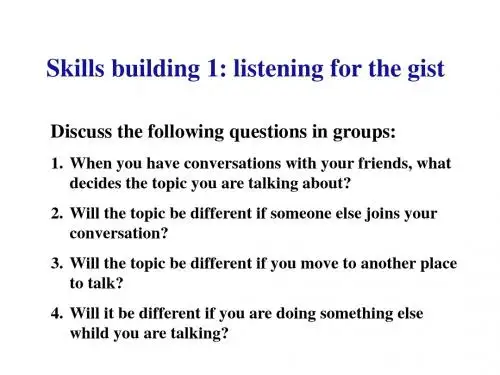
Thank you for being such a good audience.
(6) _T_h__a_n_k__y_o_u__f_o_r__y_o_u_r__k_i_n_d__a_t_t_e_n_t_io_n.
what its consequences were. We’re all gathered here to view some…
4 Mentioning your hopes I hope this has been informative and interesting for you.
(5)__I_h_o__p_e__th__a_t_y_o_u__e_n__jo__y_e_d__th__is__t_a_l_k_._____
2. Will the topic be different if someone else joins your conversation?
3. Will the topic be different if you move to another place to talk?
4. Will it be different if you are doing something else whild you are talking?
When we are listening to get the gist , we should try to find out:
1.how many people are talking 2.where they are 3.what they are doing 4.what they are talking about
江苏省启东中学高中英语必修3《Unit3BacktothepastTask》针对性训练(译林版)
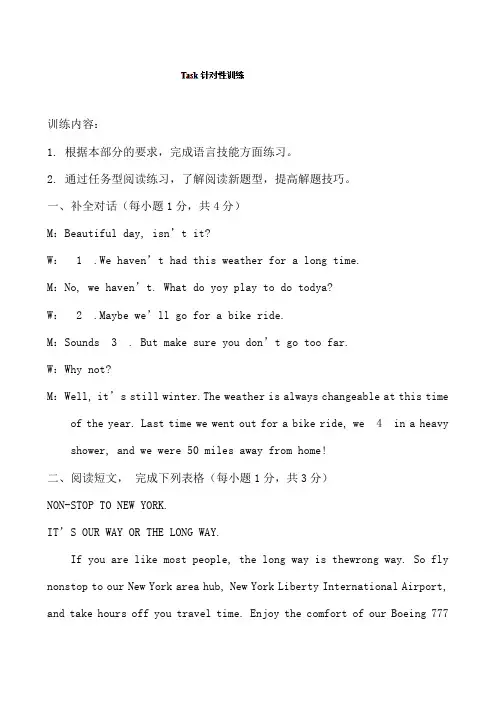
训练内容:1. 根据本部分的要求,完成语言技能方面练习。
2. 通过任务型阅读练习,了解阅读新题型,提高解题技巧。
一、补全对话(每小题1分,共4分)M:Beautiful day, isn’t it?W: 1 .We haven’t had this weather for a long time.M:No, we haven’t. What do yoy play to do todya?W: 2 .Maybe we’ll go for a bike ride.M:Sounds 3 . But make sure you don’t go too far.W:Why not?M:Well, it’s still winter.The weather is always changeable at this time of the year. Last time we went out for a bike ride, we 4 in a heavy shower, and we were 50 miles away from home!二、阅读短文,完成下列表格(每小题1分,共3分)NON-STOP TO NEW YORK.IT’S OUR WAY OR THE LONG WAY.If you are like most people, the long way is thewrong way. So fly nonstop to our New York area hub, New York Liberty International Airport, and take hours off you travel time. Enjoy the comfort of our Boeing 777aircraft which features personal entertainment systems. You will also appreciate special in flight service.For additional information, visit us at continental. com.Non-stop to New York1、AirlinesContinental AirlinesPlane Advantages _______________2、enjoy the comfort _____________________3、special in_________________ flight service4、More informationat _____________Keys一、1.Yes, it is.点拨:根据We haven t had this weahter for a long time.可知说话者赞同对方的话。
江苏省启东中学高中英语必修3《Unit2LanguageEnglishisaCrazyLanguage》教案(译林版)
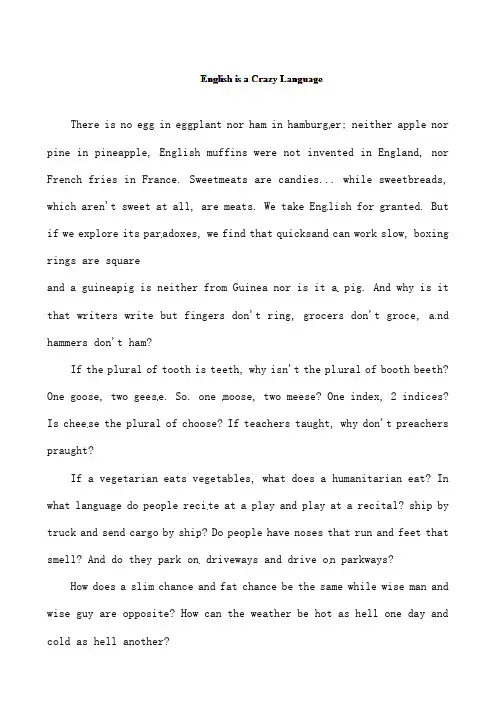
There is no egg in eggplant nor ham in hamburger; neither apple nor pine in pineapple, English muffins were not invented in England, nor French fries in France. Sweetmeats are candies... while sweetbreads, which aren't sweet at all, are meats. We take English for granted. But if we explore its paradoxes, we find that quicksand can work slow, boxing rings are squareand a guineapig is neither from Guinea nor is it a pig. And why is it that writers write but fingers don't ring, grocers don't groce, a nd hammers don't ham?If the plural of tooth is teeth, why isn't the plural of booth beeth? One goose, two geese. So. one moose, two meese? One index, 2 indices? Is cheese the plural of choose? If teachers taught, why don't preachers praught?If a vegetarian eats vegetables, what does a humanitarian eat? In what language do people recite at a play and play at a recital? ship by truck and send cargo by ship? Do people have noses that run and feet that smell? And do they park on driveways and drive on parkways?How does a slim chance and fat chance be the same while wise man and wise guy are opposite? How can the weather be hot as hell one day and cold as hell another?When a house burns up, it burns down. You fill in a form by filling it out and an alarm goes off by going on. When stars are out, they are visible but when the lights are out, they are invisible. And when I wind up my watch I start it, but when I wind up this essay, I end it.。
江苏省启东中学高考英语二轮复习模块三Unit2Language牛津译林版
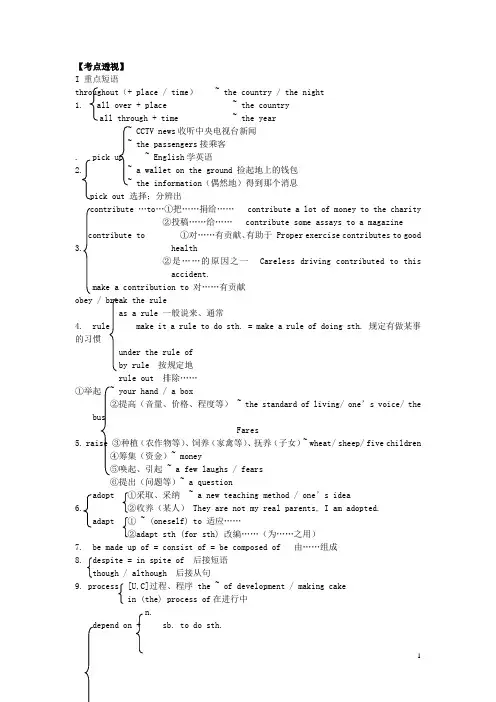
【考点透视】I 重点短语throughout(+ place / time)~ the country / the night1. all over + place ~ the countryall through + time ~ the year~ CCTV news收听中央电视台新闻~ the passengers接乘客. pick up ~ English学英语2. ~ a wallet on the ground 捡起地上的钱包~ the information(偶然地)得到那个消息选择;分辨出…to…①把……捐给…… contribute a lot of money to the charity②投稿……给…… contribute some assays to a magazinecontribute to ①对……有贡献、有助于 Proper exercise contributes to good3. health②是……的原因之一 Careless driving contributed to thisaccident.make a contribution to 对……有贡献obey / break the ruleas a rule 一般说来、通常4. rule make it a rule to do sth. = make a rule of doing sth. 规定有做某事的习惯under the rule ofby rule 按规定地rule out 排除……①举起 ~ your hand / a box②提高(音量、价格、程度等) ~ the standard of living/ one’s voice/ thebusFares5. raise ③种植(农作物等)、饲养(家禽等)、抚养(子女)~ wheat/ sheep/ five children④筹集(资金)~ money⑤唤起、引起 ~ a few laughs / fears⑥提出(问题等)~ a questionadopt ①采取、采纳 ~ a new teaching method / one’s idea6. ②收养(某人) They are not my real parents, I am adopted.adapt ① ~ (oneself) to 适应……②adapt sth (for sth) 改编……(为……之用)7. be made up of = consist of = be composed of 由……组成8. despite = in spite of 后接短语though / although 后接从句9. process [U,C]过程、程序 the ~ of development / making cakein (the) process of在进行中n.depend on + sb. to do sth.it that-clausewh-从句You can’t depend on him to come on time.10. = You can’t depend on his coming on time.= You can’t depend on it that he will come on time.It (all) depends. = That (all) depends. (口语)那得看情况(而定)。
江苏省启东中学高中英语 unit 3 looking good, feeling good en
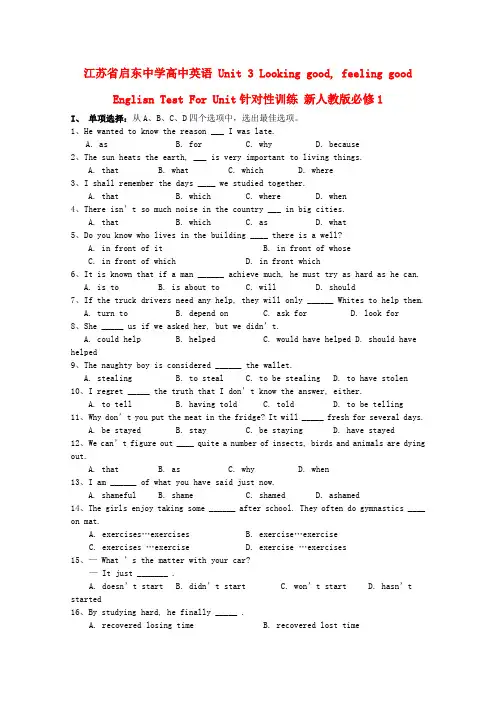
江苏省启东中学高中英语 Unit 3 Looking good, feeling good Englisn Test For Unit针对性训练新人教版必修1I、单项选择:从A、B、C、D四个选项中,选出最佳选项。
1、He wanted to know the reason ___ I was late.A. asB. forC. whyD. because2、The sun heats the earth, ___ is very important to living things.A. thatB. whatC. whichD. where3、I shall remember the days ____ we studied together.A. thatB. whichC. whereD. when4、There isn’t so much noise in the country ___ in big cities.A. thatB. whichC. asD. what5、Do you know who lives in the building ____ there is a well?A. in front of itB. in front of whoseC. in front of whichD. in front which6、It is known that if a man ______ achieve much, he must try as hard as he can.A. is toB. is about toC. willD. should7、If the truck drivers need any help, they will only ______ Whites to help them.A. turn toB. depend onC. ask forD. look for8、She _____ us if we asked her, but we didn’t.A. could helpB. helpedC. would have helpedD. should have helped9、The naughty boy is considered ______ the wallet.A. stealingB. to stealC. to be stealingD. to have stolen10、I regret _____ the truth that I don’t know the answer, either.A. to tellB. having toldC. toldD. to be telling11、Why don’t you put the meat in the fridge? It will _____ fresh for several days.A. be stayedB. stayC. be stayingD. have stayed12、We can’t figure out ____ quite a number of insects, birds and animals are dying out.A. thatB. asC. whyD. when13、I am ______ of what you have said just now.A. shamefulB. shameC. shamedD. ashamed14、The girls enjoy taking some ______ after school. They often do gymnastics ____ on mat.A. exercises…exercisesB. exercise…exerciseC. exercises …exerciseD. exercise …exercises15、— What ’s the matter with your car?— It just _______ .A. doesn’t startB. didn’t startC. won’t startD. hasn’t started16、By studying hard, he finally _____ .A. recovered losing timeB. recovered lost timeC. make missed timeD. get missed time17、This dictionary _____ all the words we use every day.A. containsB. holdsC. includesD. owns18、Only Jack can _____ me in playing tennis. Which answer is wrong?A. matchB. beatC. defeatD. win19、Seldom ______ to the cinema.A. he has goneB. has he goneC. he goesD. goes he20、The pocket radio was ____ by my little son, and I have to have it repaired.A. hurtB. damagedC. woundedD. destroyed21、Mr. Smith, ____ of the ____ speech, started to read a novel.A. tired … boringB. tiring …boredC. tired … boredD. tiring …boring22、The new law will come into ______ on the day it is passed.A. effectB. useC. serviceD. exercise23、What! _____ to go there with _____? No!A. I ; himB. I ; heC. Me ; himD. Me ; himself24、Loulan City is not at all _____ a traveler who has never seen the desert before can expect.A. thatB. whatC. whichD. where25、— How is everything, Betty?— ______ .A. Not too well, I’m afraidB. Not too badC. Very well, thank youD. It’s all right, I’m afraid26、— I put him down for a well educated man.— ______ ?— I mean that he is a well-educated man.A. I beg your pardonB. Speak louder, will youC. What’s thatD. Will you repeat word for word27、— How long do you think it is ____ he arrived here?— No more than half a year.A. whenB. thatC. beforeD. since28、— What a hot day! Have you taken a bath?— Yes, but I’d like to take _____ after finishing my homework.A. itB. thatC. oneD. another29、— I took salt for sugar this morning.— ______ .A. Does it taste good?B. WonderfulC. Oh, my goodnessD. It doesn’t matter30、— Is your father still in bed?— No, he ____ and _____ for you in the dining-room now.A. is already up ; waitingB. has got up ; waitingC. got up ; waitedD. is already up ; waitsII、完型填空:阅读下列短文,掌握其大意,然后从3—50各题所给的四个选项(A、B、C和D)中,选出最佳选项。
江苏省启东中学高中英语 Unit 3 Protecting ourselves Protecting ourselves
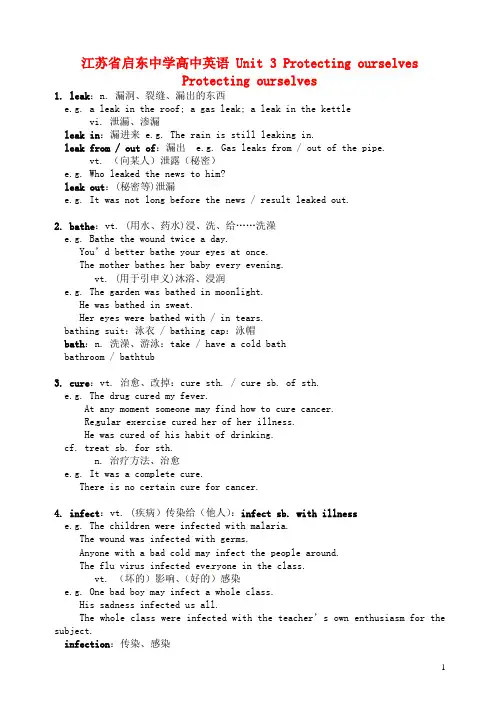
江苏省启东中学高中英语 Unit 3 Protecting ourselvesProtecting ourselves1. leak:n. 漏洞、裂缝、漏出的东西e.g. a leak in the roof; a gas leak; a leak in the kettlevi. 泄漏、渗漏leak in:漏进来 e.g. The rain is still leaking in.leak from / out of:漏出 e.g. Gas leaks from / out of the pipe.vt. (向某人)泄露(秘密)e.g. Who leaked the news to him?leak out:(秘密等)泄漏e.g. It was not long before the news / result leaked out.2. bathe:vt. (用水、药水)浸、洗、给……洗澡e.g. Bathe the wound twice a day.You’d better bathe your eyes at once.The mother bathes her baby every evening.vt. (用于引申义)沐浴、浸润e.g. The garden was bathed in moonlight.He was bathed in sweat.Her eyes were bathed with / in tears.bathing suit:泳衣 / bathing cap:泳帽bath:n. 洗澡、游泳:take / have a cold bathbathroom / bathtub3. cure:vt. 治愈、改掉:cure sth. / cure sb. of sth.e.g. The drug cured my fever.At any moment someone may find how to cure cancer.Re gular exercise cured her of her illness.He was cured of his habit of drinking.cf. treat sb. for sth.n. 治疗方法、治愈e.g. It was a complete cure.There is no certain cure for cancer.4. infect:vt. (疾病)传染给(他人):infect sb. with illnesse.g. The children were infected with malaria.The wound was infected with germs.Anyone with a bad cold may infect the people around.The flu virus infected eve ryone in the class.vt. (坏的)影响、(好的)感染e.g. One bad boy may infect a whole class.His sadness infected us all.The whole class were infected with the teacher’s own enthusiasm for the subject.infection:传染、感染5. subscribe to:捐助、出资:subscribe money to / for sth.:为……捐资e.g. The millionaire subscribed a million to / for the charity.We’ll subscribe to the football club.He subscribed generously to the new school.订阅(报纸、杂志):subscribe to / for sth.e.g. She has subscribed for / to Newsweek for many years.What will you subscribe to / for next year?支持、赞同(多用于否定句):subscribe to sth.e.g. I’ll not subscribe to that proposal.I don’t subscribe to the idea that money brings happiness.He could not subscribe to their unfair plan.subscription:n. 捐款、订阅、赞成6. choke:vt. 使……窒息:sth.choke sb.e.g. The smoke almost choked me.Every mouthful he swallowed nearly choked him.vi. 哽住、噎住e.g. He choked when he ate his food too quickly.Water went down his throat and he started to choke.choke back:(强)忍住e.g. She could hardly choke back her tears.He choked back his anger.choke down:费力地咽下e.g. He had to choke down his breakfast in order to catch the early bus.7. promote:vt. 提升、晋级:promote sb. to…e.g. The boss promote him to the post of vice manager.The instructor was promoted to professor.促进、增进e.g. promote foreign trade:促进外贸, promote auto industrypromote a new product:促销promotion:升级、晋级:get / be given a promotion8. swallow:vt. / vi. 吞、咽e.g. He swallowed the medicine with water.We swallowed all our food and drink.He just swallowed his food, for he was in a hurry.swallow up:吞没、消失在……中e.g. The waves swallowed up the swimmer.The earthquake swallowed up the whole city.She was swallowed up by the crowd.The plane was swallowed up in the clouds.swallow one’s pride:放下架子swallow one’s words:收回自己的话swallow:燕子9. bleed:(bled) vi. 出血:to have blood flowing from your bodye.g. His nose was bleeding.He was bleeding from a wound in the arm.bleed heavily:血流如注bleed to death:流血而死blood:n.sim. food / feed10. faint: vi. 晕倒、昏厥:faint from / with (doing) sth.adj. be faint with …n. fall down in a faint11. scold:vt. / vi. 责骂、斥责:scold (at) sb. for sth.e.g. My parents scolded me for lying to them.She is always scolding her children when she is irritated.He didn’t scold at me even when I made a mistake.similar use: praise / punish / reward / thank ….sb. for sth.scolding:n. 责骂e.g. I can’t stand your scolding.12. suppress:vt. = to put an end to/ prevent …from抑制、镇压、隐瞒e.g. suppress the rebellionsuppress one’s angersuppress the important factsPeople there were cruelly suppressed.The soldier suppressed his fear and went on fighting.The newspaper suppressed the name of the girl.suppression:n. 镇压、抑制13. digest:vt. 消化(食物)、理解(意思)e.g. I can’t digest milk.Cheese digests slowly.I haven’t digested your idea yet.He read quickly but didn’t digest anything.digestion:消化(力)digest:n. 摘要、文摘e.g. Readers Digest is a magazine popular with people, old and young.14. inject:vt. 注射:inject sb. with sth. = inject sth. into sb.injection:n. 注射:give sb. an injection:给……打针get / have / receive an injection:接受注射15. spoonful:n. 一调羹:a spoonful of; 两调羹: two spoonsful of / two spoonfulsofmouthful:n. 一口:a mouthful of ….handful:n. 一把:a handful of ….basketful:n. 一篮:a basketful of …16. slide:- slid – sliding:vt. 使……滑行;vi. 滑行e.g. The wet bar of soap slid across the floor.Can you make the drawers slide more smoothly?It is fun to slide on the ice.悄悄地溜走 = slip into / out of …e.g. She slid into the room, not wanting to wake the baby.The thief quickly slid behind the curtains.slide into…:不知不觉陷入(习惯、毛病)e.g. I have slid into the habit of reading while eating.17. mood: in a …mood for sth. / to do sth.Sb. be in the mood to do sth. / for doing sth.e.g. I’m not in the mood for reading / to read now.18. in prison:坐牢、监禁:put / cast / send sb. in prison:把……送进监狱be in prison:坐牢in prison / in the prison;at school / at the school at table / at the table;in charge of / in the charge of;in front of / in the front of;….19. erase:vt. 擦掉、除去e.g. You can easily erase pencil marks with a rubber.The teacher erased the words on the blackboard.He tried to erase the idea from his mind.Time can not erase his memories of war.eraser:橡皮、黑板擦20. ease:n. 舒适、安逸;自然大方live a life of ease:过着安逸的生活;greet sb. with ease:大方地与……打招呼at (one’s) ease:安详、自在、不拘束e.g. She knew that he was not at ease.He tried to appear at his ease.with ease:easily / without any difficulty:轻易地、毫不费力地e.g. Our team won the game with ease.vt. 缓和、减轻e.g. Your help eased his worries.A meeting might ease the situation.ease sb. of sth.:使……消除、解脱……e.g. The medicine eased him of his pain in the head.Can I ease you of your burden?Welcome to the unitBrainstormingNowadays, more and more people are dying from Aids, drinking, drugs and smoking. Now I’d like to ask you some common knowledge about each of them.* Aids: a. World Ai ds Day: 1, Dec.b. theme of World Aids Day of 2005: Stop Aids. Keep the P romise.c. Aids patients / victims: people who have Aids and are suffering from itd. HIV carriers: people who are carrying the virus called HIV.* Drugs: a. International Day Against Drug Abuse and Illicit Trafficking: 26, June.b. the theme of International Day Against Drug Abuse and Illicit Trafficking of 2006:Drugs are not child’s play.c. a drug addict: a person who cannot stop taking drugs* Smoking: a. World No Tobacco Day: 31, Mayb. the theme of World No Tobacco Day of 2006: Tobacco: deadly in any formor disguise.c. a heavy smoker: a person who is addicted to smoking cigarettes* Drinking: a. alcohol: a kind of colorless liquor that is found in beer and wine that makes one become stim ulated, excited or drunkb. a heavy drinker: a person who is addicted to alcohol and is often drunk.Lead-inQuestions: What do you think are good habits in one’s daily life? What are bad habits?Good habits:……Bad habits:……Talking about the picturesDivide the class into four groups and each group will talk about one of thefour posters:a. What is the poster about?b. What is the purpose of the picture?c. What should we do or not do to stay safe from the dangers shown in the poster?QuestionWhy do you think people do things that are wrong and dangerous to their health and lives?PracticeRead the articles on page 109-110 in KKLLanguage focus1. warn: warn sb. of sth. / warn sb. to do sth. / warn sb. against doing sth./warn sb. not to do sth.2. harm:vt. sth. harm sb.;n. do harm to sb. / do sb. harm.Homework1. Preview ‘Reading’.2. Do exercises on page 111-113 in KKL.3. Search for the following information:a. the first recorded cases of Aidsb. the ways people can get infected with Aids.c. Aids in Africa.d. World Aids Daye. Red Ribbon — the symbol of people who are concerned about Aids.Reading: Aids TodayRevision1. Check the homework exercises.2. Ask some students to report their findings.Reading1. Read passage quickly and answer the three questions in part A.2. Read the passage carefully and finish exercises C1-E on page 36-37.3.Language focus1. lose …to …:to be defeated;lose sb. to illness:sb. die of illness.e.g. In the semi-final of the world cup, the German football team lost to Italy. Many families lose their members to cancers.Unless we take action, more and more children will lose their parents to Aids. be lost to ….2. die of / die from / die for3. There is no + n. there / here // Sb. have no + n.4. spread: vi. sth. spread / vt. sb. spread sth.5. account for:to be the explanation or cause of something / to give an explanationof somethinge.g. The hot wea ther accounted for the rise in sales of cold drinks.He lived in the USA for several years, which accounted for his good level of English.Can you account for missing the school exam?6. seek – sought – sought:look for sthe.g. After WWII, many people left Europe to seek refuge in the USA.Nowadays, the job market is very competitive for young graduates who are seeking jobs.Before taking the medicine, you’d better seek the doctor’s advice.7. monitor:vt. to check on the progress of something / to watch something or someonecarefullyso as to find out what is happeninge.g. The president of the company will monitor how the large sum of money isused.Each of his phone calls has been monitored by the police.The government is monitoring the situat ion in this dangerous area closely.8. It is estimated that ….Homework1. Finish exercises in the paper of the 6th issue.Continent No. of HIVca rriers No. of AidspatientNo. of people killed byAidsAsiaAfricaN AmericaS AmericaEuropeWord power: Stopping bad habits Revision1. Check the homework exercises2. Practice: Translate some sentences on language focusBrainstorming1. What habits are bad habits?2. What can we do to stop these habits?3. We can say ‘We can stop these bad habits’. But what other verb can you useinstead of ‘stop’?Reading1. Read part A on page 38 and find the bad habits that Daniel has* eating food containing too much sugar* eating snacks late at night;* sleeping late until noon at weekends;* going to fast food restaurants and eating too much junk food* drinking too many soft drinks2. Which words in this part has the meaning ‘stop’?(a. stay away from; b. get out of the habit; c. keep away from; d. break thehabit;e. quit;f. give up)These words are of different groups:a. stay away from = keep away from + sb. / sp. / sth.e.g. Please stay away from bad guys / this room / fire / electricity / Internetcafes …b. give up + n. / doing: cigarettes / smoking / the idea …c. get out of the habit = break the habit + of doing sth.e.g. get out of the habit of drinking / break the habit of going to bed toolated. stop = quit + doinge.g. stop eatin g swee ts / quit talking on the phone so much3. Read the instructions in part B and fill in the blanks with suitable words andphrases.Abbreviations(缩写)Write the following on the blackboardTV, CD, Aids, HIV, SOS, UN, USA, CCTV, .com, …1. All these are abbreviations. How to read them?a. Some are read letter by letter while some are read as words2. Abbreviations can be divided intoa. Acronym: a pronounceable abbreviation(首字母缩略语,由一个复合词的头一个字母获头几个字母连接而成的词)e.g. NATO, UNESCO,b. Initialism: an abbreviation pronounced letter by lettere.g. UFO, ….c. general abbreviation: the first few letters of a worde.g. January = Jan.; Saturday = Sat.; information = info.; influenza = flu/ the flu3. Read part A on page 39 to get more information about abbreviations4. Read part B and decide which one / ones are ‘acronyms’, which initialismsand which generalHomework1. Learn the synonyms of ‘stop’ by heart.2. Find five examples of ‘acronyms’, ‘initialisms’ and ‘general’3. Preview ‘Grammar: The development of a text’Grammar: The development of a textRevision1. Test some words meaning ‘stop’.2. Ask some students to present their words of ‘acronyms’, ‘initialisms’ and‘general’.Grammar1. Read the instructions on page 38.2. Analyze ‘Reading’ on page 34 and 35.a. How many paragraphs are there in the text? (Ten)b. What is the title of the text? (Aids today)c. Can we learn what the text is about from the title?(Yes, We can learn that the text is about the deadly disease of Aids at the present time)d. How do you divide the text? What functions do they have?PracticeDo exercises on page 114-116 in KKL.Homework1. Do all the exercises from page 117 to 121 in KKL.2. Preview ‘Task: Writing an article with advice and warning’.Task: Writing an article with advice and warningRevision1. Check the homework exercises.2. Test some word spelling and word usages.Task1. Read the instructions on page 42.2. Look at page 43 and read the article in part C.Language focus1. identify:identify sb. / sth.e.g. Can you identify the man among so many people?The dead body is still not identifiedHow did you identify the wallet as yours?identification2. obligation:义务、责任fulfill one’s obligation:尽义务have ~ to sth. / sb. / to do sth.e.g. I have no obligation to that child.We have a legal obligation to pay taxes.obligate:负有法律、道德上的责任be / feel obligated to do sth.:有做……的义务、非做……不可3. indicate:vt. 说明、指示……、指……:indicate sth.e.g. This arrow indicates the way to the park.The report indicated the importance of English.Fever indicates illness.显示、表示:+ that ….e.g. Mr. Wang indicated that he wanted to change his job.His signs indicated what we should do.The smoke from the chimney indicated that there was people in the room.The black clouds indicate that it will rain.indication:指示、征兆:There be indication of …. / that …4. feel like + n. / doing / that …Homework1. Finish all the exercises from page2. Preview ‘Project: Just say no’Project: Just say NORevision1. Check the homework exercises2. Ask some students to translate some sentences orally.ReadingToday we’ll take up project of the unit. Turn to page 46, look at the title of the reading andanswer the following questions1. Can you predict what the reading is about from the title?2. What can we learn from the title ‘Just say NO’?3. The four subtitles are all questions. What can we predict each part under thesubtitles is about? (They must be the answers to these questions.)4. Why do people take drugs?(* out of curiosity * to rebel against families and society * want to be ac cepted by friends who are drug users)5. do you know how many kinds of drugs there are? What are their effect on people * uppers: increase the heart ratemake users feel energetic and happysore jaw / toothache / difficulty in sleeping / heart attacks / death * downers: decrease the heart ratemake users feel relaxed and sleepymake people forgetfulcause headaches, depression, shallow breathing, a weak pulselead to death* LSD: confuse the braincause people to see or hear things that are not realincrease blood sugar and heart rate to acute anxiety and extreme moodchangesmay commit suicide6. Is taking drugs illegal? (Not all is illegal)7. What punishment will be given if taking illegal drugs?(a small fine, a few days in prison, a large fine, death penalty)8. How to break the habit of taking drugs?* admit their problems with drugs* seek help from a hospital or drug clinic* some people need psychological helpLanguage focus1. rebel:vi.:rebel against sb./ doing sth.:反对……、造……反e.g. The people rose to rebel against the dictator(独裁者)The tribes rebelled against the government.The boys rebelled against having to come home early.The boy rebelled aga inst doing so much housework.rebellion:n.2. consume:vt. 消费、吃掉、消耗掉:consume sth.e.g. He soon consumed all his fortunes.An automobile consumes gasoline.It didn’t take the hungry boy long to consume the bread.be consumed with / by:被某种感情所吞噬、充满某种感情e.g. He was consumed with envy.She was consumed by hate.consumer:消费者;consumption:消费、消耗Homework1. Finish all the exercises from page 114-117 of the text book.2. Review the whole unit to prepare for an exam.。
江苏省启东中学高中英语必修3《Unit3BacktothepastTask》教案(译林版)
Teaching Objectives:1 to teach and instruct students some specific procedures when trying to achieve a goal2 to make students be aware of the appropriate ways of performing each individual procedure and master the skills3 to make sure students have opportunities to combine the skills they have learned with reality4 to aid students to choose and organize the information they have got and help them complete their products5 to enhance students’ overall abilities and improve their integra ted skillsImportant and difficult points:Make students learn how to write an outline of a speech and how to host a talk about a historical event.Teaching procedures:Step 1 RevisionRevise the grammar items in this u nit (object complements, either…or…and neither…nor…, and subject-verb agreement).Step 2 Lead-inGet the students to know something about how to give a talk about a historical event.Step 3 Skills building 1Make students know how to listen to get the gist, and do the listening on P52. In step1, students use the skill to listen to a conversation and find the useful expressions.Step 4 Skills building 2Make the students how to describe an illustration and try to write a description of a historical place. In step2, write a description about the Attack on Pearl Harbor according to the information found on a website.Step 5 Skills building 3Make students know what a simple outline of a speech often includes and organize some notes into an outline for a speech. In step3, plan an outline to introduce your illustration and give your talk.。
江苏省启东中学高中英语必修3《Unit2LanguagePeriod4-5ReadingEnglishanditshistory》教案(译林版)
Revision: Questions1、How do people exchange information from one to the other?(They can communicate with each other / They can use languages)2、How many kinds of languages can you think of?(written language, oral language, emoticons( a special Internet language), sign language, Braille, and animal language)3、Which language will you use when you 1) meet your friend on the road2) are happy with sth. 3) want to help a deaf 4) are on the netto show that you are sad , happy or angry? 5) are writing an article?Lead-in: Question1、So what do you think language means?(Language is a system with which people use to communicate)2、How many years have you learned English?3、Do you know anything about the development of the English language?4、What do you th ink is the most difficult part in studying English —pronunciation, grammar, vocabulary or something else? Why?5、Do you think English has always stayed the same in the long history?Can you give us some examples?6、Can you tell us how these changes happened?Reading1、Since you can’t tell me the development of the English language, pleaseopen your books to page 22 and scan the passage, then answer the three questions above.2、Now skim the passage and finish exercises C1, C2, D1, D2, and E on page 24-25.Reading strategies:Do you know how to read a story? Please look at the instruction on page 23. Then find out all useful times in the passage and finish the form:invadedLanguage focus1、be made up of:(见词汇 No. 2)2、invade:(见词汇 No. 3)3、plus:除此以外,还……,= besides, in addition to, as well ase.g. You should study hard, plus, you have to pass all the tests. He also bought some bread, plus these apples.In addition to a grammatical mistake, he misused some verbs.4、Normans: (见词汇 No. 9)5、undergo(underwent, undergone):vt. 遭受、经历(困难、变故),接受(考试、检查)e.g. The travelers underwent many difficulties.He has undergone an operation.We have undergone many hardships / changes since the war.I have never undergone such an experience before.6、have an impact on …:对……有影响,= have effect / influence on ….e.g. What the teacher said had great impact on the students. Eating bad food will have an ill impact on the health.ConsolidationDo exercises on page 98-101.Homework1、Recite the passage.2、Remember all the language points in the reading.。
【全国百强校】江苏省启东中学高一英语讲义:Module 3 Unit 3 Back to the past Word study
Module 3 Unit 3 Bac k to the pastWord study1.lecture---n. 讲座(C )When shall we attend professor Smith’s lecture on /about the environmental protection? Professor Lee will give us a lecture on how to study Engl ish well tonight.听一个有关---的讲座attend/go to a lecure on/about向某人作关于……讲座、授课give sb a lecture on ------n. 训斥(C)My father gave me a lecture for drivin g too fast.因---教训了某人一顿give sb a lecture for doing sth---v. 上讲演课;教训What did he lecture about ?My father lectured me for driving too fast.2.take over,接管, 接收;夺取①He took over his father’s comp any last week. 上周他接管了他父亲的公司。
②The area was taken over by the enemy. 那个地区已经被敌人占领了。
take相关词组:take相关词组:take off起飞;脱掉;成功,成名take in 吸收;收留;理解;欺骗take u p 开始从事;占去(时间、空间等) take on 呈现;承担;雇佣When did you take up football? (开始从事某个长期的爱好)The city has taken on a new look. (呈现出---)When will the plane take off? (起飞)His career has taken off since he got the first gold medal.(事业等飞黄腾达)The poor man had nowhere to live in, so we took him in. (收留)The Smiths usually drive to the countryside and take in the fresh air there.(吸入)I couldn’t take in why you were angry. (理解)The salesman have taken in the old people and made them buy their goods of poor quality. (欺骗)I am sorry; I will take back what I said just now.(收回)They took him for a foreigner.(把---误以为---)3.pour vi 涌流,倾泻; 涌入(出)Letters of complaint poured in. 投诉信大量涌入。
江苏省启东中学高中英语必修3《Unit 3 Back to the p
Teaching 0bjectives:1)To talk about lost civilizations2)To help the students develop the ability of reading diary entries.Important and difficult points:The way of reading diary entries.Teaching procedures:Step1Lead-in1.Ask students to name some building that could repr ese nt ancient civilization in China.2.Show students some pictures of Pompeii and Loulan and ask them to answer the followingquestions:●Where are the places in the pictures?●What have you known about them?●What else do you want to know a bout them?Step2 Reading compr ehens ion.1.Ask students to read the passage quickly a nd try to find answers to the questions in P art A.2.Ask students to read again and complete Part C1.3.Let students comple te Part C2.Step 3 Reading strategy1.Di s cuss in pairs about what features are usually included in diary e ntries.2.Let students read the Reading strategy.3.Find out the facts and historical informat ion about the two cities.in 1860Step 4 Discussion1.Is it useful for people to study things fr om the past? Why or why not?2.Since as long ago as 1553 people have said, ‘History repeats itself.’ What do you think this sayingmeans? Do you agree with it? Why or why not?Step 5Homework.1. Read the passage carefully and review the new words and phrases.2. Make a summary of the text.Period 3 Reading (2)Teaching Objectives:1)To understand the text better2)To master some useful words and expressionsImportant and difficult points:Some useful words and expressionsTeaching procedures:Step 1 Check the homework.Step 2 Complete the summary with proper words.Both Pompeii in ________and Loulan in China became ____ ________ about 2000 years ago. Pompeii was ________ in the 8th century BC and was _____ _______ by the Romans in 89BC. On 24th Aug.AD79, Mount Vesuvius _________ and the city were _______ __________. Loulan was a _________ _________ on the Silk Road. It d isap peared under the ________. There are just a few _________ left. Some _________, such as coins and painted pots, was found.Step 3 Exercises on the new word s.Step 4 Word studyStep 5 Homework:1.Review the new words.2.Finish the exercises in the workbook.。
- 1、下载文档前请自行甄别文档内容的完整性,平台不提供额外的编辑、内容补充、找答案等附加服务。
- 2、"仅部分预览"的文档,不可在线预览部分如存在完整性等问题,可反馈申请退款(可完整预览的文档不适用该条件!)。
- 3、如文档侵犯您的权益,请联系客服反馈,我们会尽快为您处理(人工客服工作时间:9:00-18:30)。
•Presenting
Planning
• Work in small groups and discuss and choose what characters the group would like to research. • Discuss the layout of the booklet. • Divide the work each group member will do. •Collect the information needed.
Nowadays, more and more foreigners are learning Chinese, can you tell me why does the change take place?
Starting the project--How to design a booklet •Planning •Preparing •Producing
In the 1950s.
Listen to the tape and give the main idea of each part.
Para. 1. Form and development of Chinese characters. Pronunciation of Chinese characters and simplified Chinese characters. Brief introduction of Chinese characters. The origins of Chinese characters.
Para. 2.
Para.3-6 Para. 7-8
Para. 1
Chinese people invented numerous ideas characters to represent________, objects actions _________ or _________.
Para. 2
泰州田家炳实验中学
讲课人: 高翔
What can we do with a rope?
We can use a rope to record something that we want to remember.
东巴象形文
我
是 谁
龟
鹿
鸟
马
鱼
象
鸡
虎
…
How did Chinese characters develop?
project
Read the article quickly and answer questions. 1.How old is the Chinese writing?
2.Who invented Chinese characters? 3.How was Chinese writing invented?
Cang Jie saw the footprints of birds and animals in the snow and he got the idea he could use different shapes or pictures to represent objects.
4.When did the Chinese government simplified characters?
4.When did the Chinese government simplified characters?
1.How old is the Chinese writing? Thousands of years. 2.Who invented Chinese characters? Cang Jie 3.How was Chinese writing invented?
pictograph
drawings ____________ into
standard forms _______________
Para. 7-8
pictophonetic
蚂 蚁 蜻 蜓
Pronunciation of Chinese characters and simplified Chinese characters.
the very first Chinese characters
shapes or pictures Use different _______________ objects to represent different________
Para. 3-6
_________________ change over time until they became ________________ Develop from
Page 3 Page 4
Paook for information as many sources as you can find. Tips (organizing information) 1.Introduction 2.Method 3.Findings 4.Conclusion
Use the table to plan the layout and assign tasks to group members:
Booklet Cover Introduction Introduction Content Who will write and research this?
Page 2
Producing • Everyone writes a section
of the booklet. Then put what has been written together. Add photos or illustrations where necessary. • Proofread the draft to correct mistakes if there are any. • New ideas can be added. • Now the booklet is finished.
